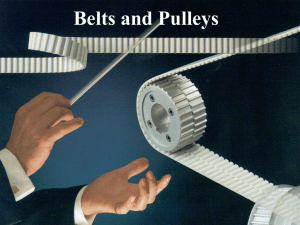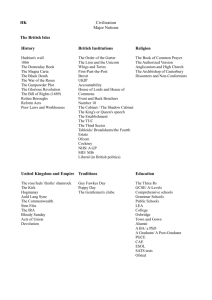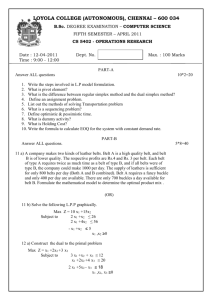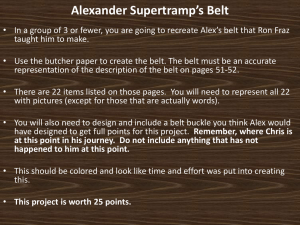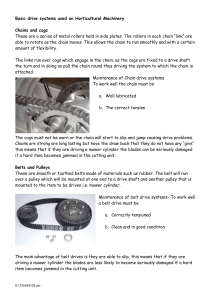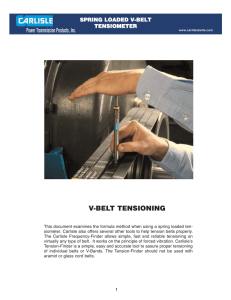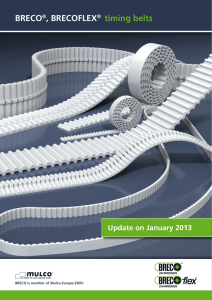Belts, Clutches and Brakes
advertisement
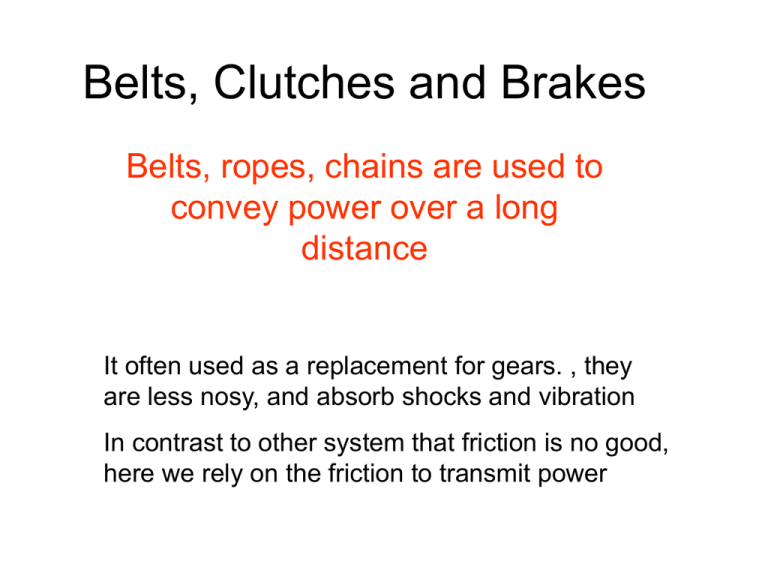
Belts, Clutches and Brakes Belts, ropes, chains are used to convey power over a long distance It often used as a replacement for gears. , they are less nosy, and absorb shocks and vibration In contrast to other system that friction is no good, here we rely on the friction to transmit power Brakes and clutches are essentially the same devices. Each is associated with the rotation • Brakes, absorb kinetic energy of the moving bodies and covert it to heat • Clutches Transmit power between two shafts Belts • They are four types of the belts Size range center distance T=0.75 to 5 mm No upper limit d= 3to 19 mm A=13 to 38 mm B=8 to 23 mm 2β= 34o to 40o p=2 mm and up No upper limit Limited Limited Belts are made from fiber reinforce urethane or rubber-impregnated fabric reinforced with steel or Nylon • Flat belts has to operate at higher tension than the V belt • V belt speed should be in the range of 7000 fpm. • V belts are slightly less efficient than flat belts, but it can transmit more power. Timing Belt Timing belts transmit power at the constant angular velocity ratio, application when precise speed ratio is important Belt Drives, and its dimensions Due to friction, the tight-side tension is greater than the slack-side tension. T ( F1 F2 )r Initial tension recommended Fi 1 ( F1 F2 ) 2 Due to friction, the tight-side tension is greater than the slack-side tension. T ( F1 F2 )r r= pitch radius, from the center to the neutral axis of the belt F1 =tension on the tight side F2 =tension on the slack side Initial tension recommended 1 Fi ( F1 F2 ) 2 Transmitted horse power ( F F2 )V Tn hp 1 33000 63000 dn V 12 T torque lb-in, n rpm, d pitch in, V fpm Speed ratio n1 r2 n2 r1 w 2 Fc V g Tension in the flat belt or round belt From the free body Diagram Fx 0 F y 0 dF fd F Fc F1 Fc e f F2 F d d 0 fdN F cos 2 2 d 0 dN Fc d ( F dF F ) sin 2 ( F dF ) cos For the V belt F1 Fc e f / sin F2 F From these equation s you can evaluate tension in the belt e f / sin T ( F1 F2 )r1 F1 Fc e f / sin F2 F T1 F1 Fc ( ) 1 r1 Maximum tension in the belt considering the effects of bending in the belt • Fmax=KsF1 • Ks Service factor Belts are subjected to the fatigue loading Clutches Important issue , how much force we need to stop the rotation How much force is needed to stop the Drum
